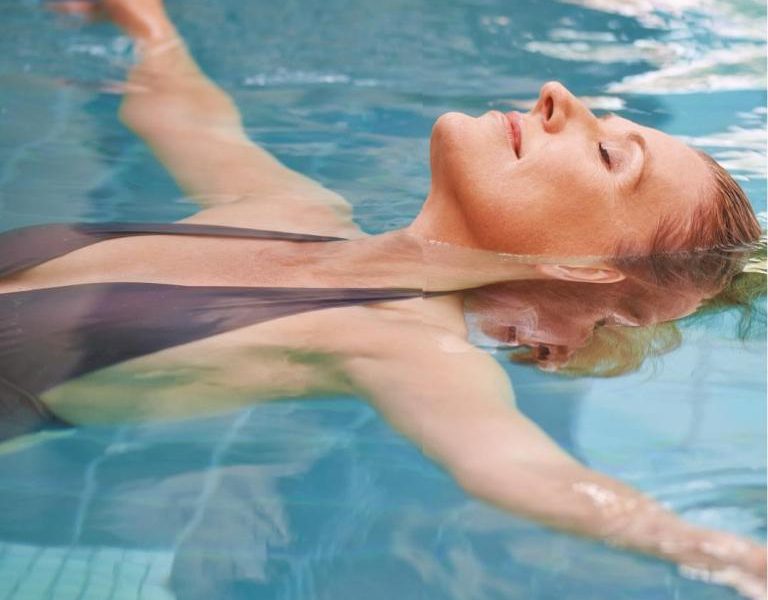Anyone who likes a dip will tell you that sliding into the cool, blue abyss on a regular basis does more than simply burning a few hundred calories. A stint of lane swimming is beneficial to the body in many ways, but we’re now understanding its power over our brains, too. From aiding nerve function to warding off negative thoughts, we take a deep dive into how swimming is the natural way to boost both body and mind…
1. No phones please
Being bombarded by social media updates, work emails and endless notifications has become part and parcel of the modern world, but many experts believe our increasing screen time has a negative effect on our bodies and minds. Phones and pools are not happy bedfellows and switching off from tech for even half an hour gives your brain a digital detox, plus swapping that scrolling time for physical activity is even better.
2. Silence is golden
The world is very noisy and some forms of exercise continue the assault on your ears, whether you’re sweating it out in a class or running through your personal playlist on the treadmill. The pool is usually a place where you can escape noise pollution and give your thoughts space to luxuriate in peace and, many poolside regulars claim to get some of their best creative thinking done during their daily breaststroke. On top of this, a recent study found that mice exposed to silence created new cells in the hippocampus, the part of the brain responsible for learning, remembering, and emotions… perhaps silence isn’t so awkward after all.
3. Get your om on
Skip your Headspace session if you’re heading to the leisure centre, as concentrating on each stroke mindfully represents a chance for your brain to have a clear-out. By focusing on your swim and gently shutting out external stimuli your mind is given the chance to deeply relax, as in meditation. Meditative states stimulate a part of the nervous system that help to repair and rejuvenate both the body and mind, leading to reduced pain, anxiety and stress and aiding restful sleep, so you’ll feel extra refreshed after a dip.
4. Control your cortisol
Working up a sweat could be the solution to many of life’s everyday stresses, helping us to deal with any difficulties in a calmer way. Natalie Cawley, counselling psychologist and psychotherapist (principlepsych.com) says: “Practising light cardio such as swimming, reduces the release of the stress hormone cortisol into the blood, in turn reducing anxiety. On a very simple level, it can also make us feel more content as exercise releases endorphins.”
5. Going solo
With nobody to out-bench you and no score-card to focus on, swimming is a great way to explore your own personal sense of achievement. As Natalie explains: “Swimming is an activity that is usually engaged in as a solo event, therefore there is less pressure or competition, which can bring about a positive feeling of autonomy and control.” It’s win-win!
6. Complement your workout
“Swimming is the perfect complement to strength training, such as barre or heavier gym workouts,” says Vicki Anstey, one of the UK’s leading trainer and fitness experts. “Mobility is fundamental to building strength and swimming is a great way to increase the extensibility of your tissues while giving you a ‘deload day’ in-between other workout or strength sessions, while also keeping the cardiovascular system healthy.”
7. Recovery room
Anyone who’s injured themselves – or simply had a bad case of DOMS (delayed onset muscle soreness from over-training or trying something new) – will know how frustrating it can be trying to get back to full strength. But, Elliot Upton, personal trainer at Ultimate Performance (upfitness. com) says we needn’t be stuck on the sofa in the meantime: “Swimming can be a great form of active recovery from resistance training or any activity that is taxing on the muscles. Swimming can aid recovery; getting the body moving again and helping increase blood flow and nutrient delivery to damaged muscles.” You’ll be fighting fit again in no time.
8. Anyone can do it
Swimming can be for everyone, and it’s never too late to start. Most public pools offer adult lessons and those with health concerns or joint issues shouldn’t be put off. “Swimming is very low-impact and low-stress, particularly for people with joint issues. A swim can be a great stress-reliever and we know stress management is a cornerstone for maintaining healthy eating habits and managing bodyweight more effectively. Plus, it has a much lower barrier to entry compared to HIIT (high-intensity interval training) or strength training,” says Elliot.
9. Wet and wild
Swimming anywhere is beneficial but by adjusting your environment you may find further benefits. Philip Hatzis, founder of Tri Training Harder explains: “Pool swimming, though seemingly repetitive, can bring focus and discipline while being a great full-body workout. Alternatively, open water swimming can lead you to some of the more beautiful encounters with the natural world.” Outdoor swimming fans cite a feeling of oneness with nature, of being positively grounded and a healthy enforced time-out for the mind – especially if faced with challenging temperatures.
10. Body acceptance
For anyone struggling with body image, frequently being acquainted with their swimsuit-clad body can prove to be empowering. When you realise no one is focused on how you look poolside and your fellow swimmers – of all shapes and sizes – are focusing on their own enjoyment, the experience becomes mundane and can help you to unite your body and mind again.






















